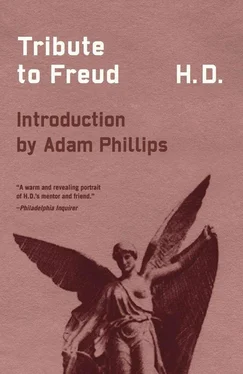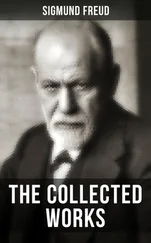May 1936
MY SINCERE THANKS FOR YOUR KIND
REMEMBRANCE ON THE OBSERVANCE
OF MY EIGHTIETH BIRTHDAY
Your Freud
Will you forgive me this barbaric reaction to such loving expressions [of friendship]? I am sure Yofi is very proud of being mentioned by you. Believe it or not, early on the sixth she came into my bedroom to show me her affection in her own fashion, something she has never done before or after. How does a little animal know when a birthday comes around?
24 May 1936
XIX Strasserg 47
Wien IX., Berggasse 19
Dear H. D.
All your white cattle safely arrived lived and adorned the room up to yesterday.
I had imagined I had become insensitive to praise and blame. Reading your kind lines and getting aware of how I enjoyed them I first thought I had been mistaken about my firmness. Yet on second thoughts I concluded I was not. What you gave me, was not praise, was affection and I need not be ashamed of my satisfaction.
Life at my age is not easy, but spring is beautiful and so is love.
Yours affectionately
Freud
20 September 1936
Wien IX., Berggasse 19
Belated, though sincere, congratulations on the occasion of your fiftieth birthday from an eighty-year-old friend.
Fr.
26 February 1937
Wien IX., Berggasse 19
Dear H. D.
I have just finished your Ion. Deeply moved by the play (which I had not known before) and no less by your comments, especially those referring to the end, where you extol the victory of reason over passions, I send you the expression of my admiration and kindest regards,
Yours,
Freud
“The past is literally blasted into consciousness with the Blitz in London,” H. D. said. Her sessions with Sigmund Freud, when she first wrote about them in 1944, were a part of the past. With him, the desk and walls of his consulting room filled with bibelots which were tokens of history, she had gone back to her childhood, back to the breakup of her marriage and the birth of her child, back to the death of her brother in service in France, and the consequent death, from shock, of her father, and back to the breakup of her literary circle in London — Aldington, Pound, Lawrence, each gone his way. In the Vienna of the early 1930s, with its lengthening shadows, she was putting together the shards of her own history, facing a new war, knowing it would come, fearing it as she had feared its predecessor.
Freud helped her to remember and to understand what she remembered. When she composed “Writing on the Wall,” published in book form as Tribute to Freud, the war had come. Destruction was not a threat but a reality. Experience was a palimpsest. Again she recognized for herself the importance of persistence in remembering. Remembering Freud was significant, for remembering him was remembering what she had remembered with him. “For me, it was so important,” she wrote, repeating, “it was so important, my own LEGEND. Yes, my own LEGEND. Then, to get well and re-create it.” She used “legend” multiply — as story, a history, an account, a thing for reading, her own myth. H. D.’s war years brought an astonishing revitalization. Silent in a sense for years, suddenly she wrote her war trilogy, several novels and short stories which are still unpublished, the text of By Avon River, drafts of Bid Me to Live , and Tribute to Freud. They were re-creations. All literature is.
The earlier version of Tribute to Freud has been out of print in America. Its reputation and its fascination as an informal portrait of the great psychoanalyst have persisted. In the past two years an English edition has appeared, as well as a French and an Italian translation. A German translation will appear shortly. Ernest Jones, Freud’s biographer, reviewed the 1956 publication in The International Journal of Psycho-Analysis. He set a tone. “The book, with its appropriate title,” he said, “is surely the most delightful and precious appreciation of Freud’s personality that is ever likely to be written. Only a fine creative artist could have written it. It is like a lovely flower, and the crude pen of a scientist hesitates to profane it by attempting to describe it. I can only say that I envy anyone who has not yet read it, and that it will live as the most enchanting ornament of all the Freudian biographical literature.” H. D. was pleased. She would have been pleased by its most recent praise; Norman Holland in his Poems in Persons (1973), a psychoanalytic study of the creation and reception of poetry, says, “I know of no account by an analysand that tells more about Freud, his techniques, or the analytic experience as it seems from within.” This expanded version of Tribute to Freud tells still more.
“Writing on the Wall” was written, as she says in her prefatory note, “with no reference to the Vienna note-books of spring 1933.” These had remained in Switzerland. It was when she returned to Lausanne after the war and recovered the notebooks that she wrote “ ‘Advent,’ the continuation of ‘Writing on the Wall,’ or its prelude.’ ” The original had been a meditation; “Advent” was its gloss. This more personally detailed section was omitted from the originally published book. Now, however, it is appropriate to include the second part, in which she comments on “Writing on the Wall” as well as expands herself and the significance of self. “Advent” is testimony.
“I am on the fringes or in the penumbra of the light of my father’s science and my mother’s art — the psychology or philosophy of Sigmund Freud,” she wrote in “Advent.” “I must find new words as the Professor found or coined new words to explain certain as yet unrecorded states of mind or being!” There had been recordings, of course, Freud’s own or like Otto Rank’s The Myth of the Birth of the Hero, which Freud shrewdly recommended to her when she told him of her dream of the Egyptian princess and the child afloat in the bulrushes. But Freud does, she wrote, “follow the workings of my creative mind.” Freud knew she had to make her own recordings. No one else could do that for her. Freud had a passionate concern with the ontogeny of art. It was by no accident that the theosophist van der Leeuw and H. D. had contemporary hours on the Berggasse.
“I begin intensive reading of psychoanalytic journals, books and study Sigmund Freud,” she wrote in 1932. “There is talk of my possibly going to Freud himself in Vienna.” The one who principally talked was Freud’s distinguished student and member of the Circle, Dr. Hanns Sachs, whom H. D. had known in Berlin and with whom she had had sessions. Earlier than these, and less satisfactory, were some twenty-four sessions in 1931 in London with Mary Chadwick, to whom she had gone when the collapse of a friend threatened her own collapse. Still earlier had been the informal conversations with Havelock Ellis in Brixton at the close of World War One. He had traveled, later, in 1920, on the same boat with Bryher and herself
to Malta and Greece. The companionship seems to have made no memorable impact on any of them. Disappointed in his indifference to her manuscript “Notes on Thought and Vision,” she remembered him chiefly in terms of Norman Douglas’s mot: “He is a man with one eye in the country of the blind.”
In Freud’s fuller vision she found both stimulation and encouragement. Years later than either “Writing on the Wall” or “Advent” she returned again to his memory. The end of her life was near, and she was hospitalized with a broken hip. “Of course,” she wrote, “as the Professor said, ‘there is always something more to find out.’ I felt that he was speaking for himself (an informal moment as I was about to leave). It was almost as if something I had said was new, that he even felt that I was a new experience. He must have thought the same of everyone, but I felt his personal delight, I was new. Everyone else was new, every dream and dream association was new. After the years and years of patient, plodding research, it was all new.”
Читать дальше











